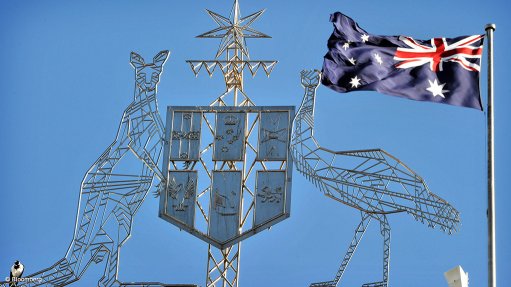
Photo by: Bloomberg
PERTH (miningweekly.com) – The Australian Petroleum Production and Exploration Association (Appea) has expressed concern around the proposed mandatory code of conduct (Gas Code), saying that while it recognises the critical need for investment in new gas supply, it failed to ‘adequately address’ investor uncertainty.
The federal government this week released the Gas Code for final consultation, maintaining that the Gas Code will ensure domestic prices are reasonable by establishing a price anchor, or mechanism to drag prices down, through the combination of a price cap, which is to be set at $12/GJ and subject to a review commencing by 1 July 2025, and a process for qualifying for exemptions from the price cap on the basis of making satisfactory Australian Competition and Consumer Commission (ACCC) and court enforceable supply commitments
The Gas Code would also allow small producers of gas to be exempt from the price cap if they supply only the domestic market.
In addition, it will require all participants to abide by conduct provisions that will level the negotiating playing field between users and producers to deliver a better functioning gas market.
“While automatic exemptions from price controls are proposed for small domestic-only producers, in most cases meaningful supply investments will require further conditional exemptions. This will be at the joint discretion of the Climate Change and Energy Minister and Resources Minister and will need to be approved by five separate government departments and agencies,” Appea CEO Samantha McCulloch said.
“Exemptions will start at 12 months in length, meaning projects may need to reapply many times over the course of project operations, with no guarantee that the basis for an exemption today will be sufficient for an exemption in the future.
“Conditional exemptions may also be varied or revoked at any time. Long-term capital investments for new gas supply cannot be made on the basis of one year of certainty.
“The draft Code moves away from a ‘cost plus’ model and binding arbitration, but the revised approach still adds significant complexity and Ministerial discretion to the operation of the gas market and is unlikely to address the concerns from investors,” McCulloch said.
She noted that the extension of the 12-month temporary price cap for at least another two years was at odds with the recommendations from the International Energy Agency, which only days ago made clear that the temporary price cap should not become permanent because investment may be put at risk.
The federal government at the end of last year introduced an emergency gas cap of A$12/GJ on un-contracted gas, stating that it would only be valid for a period of 12 months and that it would be reviewed mid-2023.
In an interview with ABC Radio, Climate Change and Energy Minister Chris Bowen argued that the two year extension on the gas would ‘cut the link’ between the volatile international gas prices and the prices paid by Australian consumers for Australian gas.
“The test for the Code will ultimately be whether it can support investment in critically-needed new gas supply. Our members will be seeking urgent clarity on the implications for their proposed supply investments during the course of the consultation period,” McCulloch said this week.
She said the sector understood the challenges faced by businesses and consumers due to global energy system pressures and was committed to delivering competitively-priced gas.
“While we are still working through the full implications of this latest intervention, initial reviews suggest further clarity and refinement will be needed across a number of areas to ensure the domestic gas market is able to function effectively,” she said.
“Appea and its members will continue to engage constructively with the government to find a workable way forward to finalise the Code and ensure investments in new gas supply can be made.”